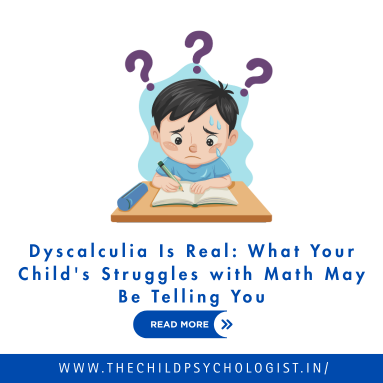Does your child freeze at the sight of numbers? Do they take unusually long to count on fingers, confuse 6 and 9, or cry during math homework?
These may be more than just “weakness in math.” They could be signs of Dyscalculia, a specific learning disorder that impacts how a child understands numbers and mathematical concepts.
What is Dyscalculia?
Dyscalculia is a neurodevelopmental learning disorder that affects a child’s ability to:
- Recognize numbers and symbols
- Perform basic arithmetic
- Understand mathematical reasoning
Just like dyslexia affects reading, dyscalculia affects math—and it is equally real and valid.
Children with dyscalculia:
- May be intelligent, creative, and strong in other subjects
- Often enjoy storytelling, art, or sports
- But face extreme difficulties with even simple math operations
Important: It’s not about laziness or lack of effort. Dyscalculia is a brain-based learning difference.
Why Identifying Dyscalculia Matters
Early signs of dyscalculia are often misinterpreted as carelessness, lack of focus, or laziness. Without the right support:
- Children develop math anxiety
- They start avoiding schoolwork
- Their confidence and self-esteem decline
With timely behaviour counselling, special education, and therapy, children can cope—and even succeed—in mathematics.
Common Signs of Dyscalculia
Parents and teachers should watch for these red flags:
- Difficulty recognizing numbers or counting objects
- Frequent mistakes in simple addition or subtraction
- Reliance on fingers well beyond age-appropriate levels
- Trouble remembering math facts (e.g., 2 + 3 = 5)
- Struggles with time, money, and measurement
- Confusion with math symbols (+, −, ×, ÷)
- Anxiety, tantrums, or tears during math work
If your child shows several of these consistently, it may be time for a professional evaluation.
What Can Parents Do? Practical Steps
As a child psychologist in Indore, I often meet families who say:
“My child is so bright—but math just doesn’t click.”
Here are six steps parents can take to support a child with suspected dyscalculia:
1. Observe Gently
Notice which math concepts confuse your child. Do they struggle only with numbers, or with related areas like time and money? Keep a simple log.
2. Don’t Blame
Avoid negative remarks like “you’re careless” or “you need to try harder.” Children with dyscalculia are already trying—their brain just processes numbers differently.
3. Get a Psychoeducational Assessment
A formal assessment is the first step to clarity. Tools like the NIMHANS SLD Index or WRAT (Wide Range Achievement Test) help confirm dyscalculia while ruling out low IQ or attention issues.
Assessments also guide therapy plans and school accommodations.
4. Start Remedial Support
Special educators and therapists use structured, multisensory teaching methods to strengthen math concepts. For example, they may use blocks, beads, or number lines to make abstract numbers concrete.
5. Build Math into Daily Life
Make math less scary by linking it to everyday activities:
- Let your child handle money at the grocery store
- Cook together and measure ingredients
- Use board games or puzzles that involve numbers
6. Stay Positive
Celebrate even the smallest progress. Whether your child solves one problem or learns to use a number line, your encouragement fuels confidence.
A Parent’s Story
“We thought our daughter just hated math. But after a proper assessment, we realized she had dyscalculia. With remedial support and behaviour counselling, she’s now able to add, subtract, and even enjoy puzzles. Her confidence is back!”
Closing Thought
Not every math struggle is dyscalculia—but every struggling child deserves understanding, not blame. If your child consistently fears or avoids math, it’s worth exploring the root cause.
Early identification, compassionate behaviour counselling, and the right learning environment can unlock your child’s true potential.
About the Author
Dr. Vini Jhariya
Clinical and Child Psychologist | RCI Registered | M.Phil. (Clinical Psychology) | Ph.D. (Pursuing)
Founder – Urjasvini Child Development Center & Special School, Indore
